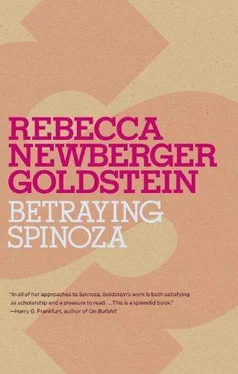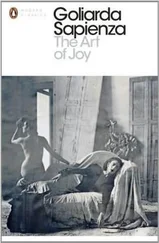Rebecca Goldstein - Betraying Spinoza - The Renegade Jew Who Gave Us Modernity
Здесь есть возможность читать онлайн «Rebecca Goldstein - Betraying Spinoza - The Renegade Jew Who Gave Us Modernity» весь текст электронной книги совершенно бесплатно (целиком полную версию без сокращений). В некоторых случаях можно слушать аудио, скачать через торрент в формате fb2 и присутствует краткое содержание. Год выпуска: 2009, ISBN: 2009, Издательство: Random House, Inc., Жанр: Биографии и Мемуары, на английском языке. Описание произведения, (предисловие) а так же отзывы посетителей доступны на портале библиотеки ЛибКат.
- Название:Betraying Spinoza: The Renegade Jew Who Gave Us Modernity
- Автор:
- Издательство:Random House, Inc.
- Жанр:
- Год:2009
- ISBN:978-0-80524273-7
- Рейтинг книги:5 / 5. Голосов: 1
-
Избранное:Добавить в избранное
- Отзывы:
-
Ваша оценка:
- 100
- 1
- 2
- 3
- 4
- 5
Betraying Spinoza: The Renegade Jew Who Gave Us Modernity: краткое содержание, описание и аннотация
Предлагаем к чтению аннотацию, описание, краткое содержание или предисловие (зависит от того, что написал сам автор книги «Betraying Spinoza: The Renegade Jew Who Gave Us Modernity»). Если вы не нашли необходимую информацию о книге — напишите в комментариях, мы постараемся отыскать её.
Betraying Spinoza: The Renegade Jew Who Gave Us Modernity — читать онлайн бесплатно полную книгу (весь текст) целиком
Ниже представлен текст книги, разбитый по страницам. Система сохранения места последней прочитанной страницы, позволяет с удобством читать онлайн бесплатно книгу «Betraying Spinoza: The Renegade Jew Who Gave Us Modernity», без необходимости каждый раз заново искать на чём Вы остановились. Поставьте закладку, и сможете в любой момент перейти на страницу, на которой закончили чтение.
Интервал:
Закладка:
Rebecca Goldstein
Betraying Spinoza: The Renegade Jew Who Gave Us Modernity
For Steve
DESPITE SPINOZA
I
Prologue: Baruch, Bento, Benedictus
By what right is Benedictus Spinoza included in this series, devoted as it is to Jewish themes and thinkers?
Can the seventeenth-century rationalist, who produced one of the most ambitious philosophical systems in the history of Western philosophy, be considered, by any stretch of interpretation, a Jewish thinker? Can he even be considered a Jew? Benedictus Spinoza is the greatest philosopher that the Jews ever produced, which adds a certain irony to his questionable Jewishness.
He was excommunicated at the age of twenty-three by the Portuguese-Jewish community in which he had been raised and educated. It was a community of refugees from the Spanish-Portuguese Inquisition, a Jewish calamity whose tragic proportions would be exceeded only in the twentieth century. The members of the community were predominantly former Marranos, who had lived on the Iberian Peninsula, mostly in Portugal, as practicing Christians since Judaism had been formally outlawed on the peninsula at the end of the fifteenth century. The word marrano is believed to derive from the old Castilian for “swine,” a particularly apt slur to insult those believed to be concealing Jewish practice beneath Christian performance. The relatively liberal city of Amsterdam provided the conditions for their reconnecting to a Judaism that most of them barely knew. Brutal forces of history had given this community its distinctive tone: ambitious for the material trappings of middle-class stability and yet skittish, anxious; enviably accomplished and cosmopolitan and yet filled with religious intensity, confusion, disillusion, and messianic yearning.
Before his expulsion from it, the hothouse world of Amsterdam’s Sephardim — as Jews who derived from Spain ( Sepharad in Hebrew) continue to be called to this day — had been Spinoza’s world as well. Yet when it closed its doors to him, he made no attempt to reenter it or any other Jewish community.
Excommunication, as it was practiced in his community, was not as severe and final a punishment as the word now suggests. The period of isolation from the community (the terms of excommunication did not extend outside of Amsterdam) typically lasted anywhere from a day to several years. The imposed banishment was a tool of chastisement resorted to with quite common frequency, fundamentally a form of public embarrassment with which to exert control over the volatile mix contained within “the Portuguese Nation,” as the Amsterdam Sephardim continued to identify themselves.
Whereas others among the chastised had obediently— and sometimes desperately — sought reconciliation, Spinoza calmly removed himself from any further form of Jewish life. Nor did Spinoza seek out another religion. In particular, he did not convert to Christianity, though it would have been convenient for him to do so. Spinoza opted for secularism at a time when the concept had not yet been formulated.
He supported himself by grinding lenses, which was no lowly menial occupation, as it is often presented to have been in romanticizing versions of the philosopher’s life, but was rather a craft that drew extensively from Spinoza’s serious interest in the science of optics. The quality of his wares was highly valued by other scientists of his day. The important Dutch astronomer Christiaan Huygens, who discovered Saturn’s rings as well as one of its four moons, preferred Spinoza’s lenses to all others. “The [lenses] that the Jew of Voorburg has in his microscopes have an admirable polish,” Huygens wrote to his brother in 1667. 1The one part of the romantic lens-grinding legend that is sadly true is that the dust from the optical polishing was unhealthy for Spinoza, whose mother and brother had both died young from tuberculosis. He himself succumbed to the disease at the age of forty-four.
Spinoza’s personal life was, as he wished it to be, simple and relatively isolated. There was a small circle of devoted friends, freethinking Christians from various dissenting Protestant circles, who regarded Spinoza as their master and closely studied, and guarded, his thoughts. He combined a Marranoist cautious discretion about revealing his true views to the dangerously narrow-minded with a touching faith in the power of reason to persuade. So he published his Tractatus Theologico-Politicus ( The Treatise on Theology and Politics ) anonymously, but also hoped that it would convince the powers that be of its main conclusion, which is succinctly stated in the book’s subtitle: Wherein is set forth that freedom of thought and speech not only may, without prejudice to piety and the public peace, be granted; but also may not, without danger to piety and the public peace, be withheld . The book evolves into one of the most impassioned defenses of a free democratic state in the history of political theory, an eloquent plea for the separation of church and state. Spinoza allowed himself to hope that, should its argument for tolerance find its mark, he might be able to publish the work on which he had been toiling for years. The rain of abuse that poured down on the author of the Tractatus , whose true identity was soon an open secret throughout Europe, made him a very dangerous man to even remotely acknowledge, and all but foreclosed the possibility of his publishing his magnum opus in his lifetime. This is The Ethics , a work that makes all the claims for reason that have ever been made.
Some favors came his way. The University of Heidelberg, which had fallen from its perch of previous glory through the prolonged tribulations of the Thirty Years’ War, had no professor of philosophy on staff and, in the name of Karl Ludwig, Elector Palatine, offered him a chair of philosophy. “You will not find elsewhere a Prince more favorably disposed to men of exceptional genius, among whom he ranks you. You will have the most extensive freedom in philosophizing, which he believes you will not misuse to disturb the publicly established religion.” The philosopher delicately declined: “If I had ever had any desire to undertake a professorship in any faculty, I could have wished for none other than that which is offered me through you by the Serene Highness the Elector Palatine, especially on account of the freedom to philosophize that this most gracious Prince is pleased to grant, not to mention my long-felt wish to live under the rule of a Prince whose wisdom is universally admired.” But his instinct for caution had been alerted by the ambiguity of the terms of the offered freedom. “I do not know within what limits the freedom to philosophize must be confined if I am to avoid appearing to disturb the publicly established religion. … So you see, most Honorable Sir, that my reluctance is not due to the hope of some better fortune, but to my love of peace, which I believe I can enjoy in some measure if I refrain from lecturing in public.”
Some important intellectual figures of the day made their way to the modest rooms he rented in the Hague in his last years, including the up-and-coming young go-getter Gottfried Wilhelm Leibniz, who would emerge as one of the most dazzling figures in the seventeenth century’s impressive lineup of genius. Leibniz spent a few days with Spinoza, conversing on metaphysics. The only written record of their extensive conversations was a slip of paper on which Leibniz had written down, for Spinoza’s approval, a proof for God’s existence. Leibniz was profoundly influenced by Spinoza’s ideas but sought always to conceal his philosophical debt, and is on record as denouncing the philosopher. When a professor of rhetoric at the University of Utrecht, one Johan Georg Graevius, wrote to Leibniz, castigating the Tractatus Theologico-Politicus as a “most pestilential book,” whose author “is said to be a Jew named Spinoza, but who was cast out of the synagogue because of his monstrous opinions,” 2Leibniz prudently chimed in with his own diplomatic calumny: “I have read the book by Spinoza. I am saddened by the fact that such a learned man has, as it seems, sunk so low.”
Читать дальшеИнтервал:
Закладка:
Похожие книги на «Betraying Spinoza: The Renegade Jew Who Gave Us Modernity»
Представляем Вашему вниманию похожие книги на «Betraying Spinoza: The Renegade Jew Who Gave Us Modernity» списком для выбора. Мы отобрали схожую по названию и смыслу литературу в надежде предоставить читателям больше вариантов отыскать новые, интересные, ещё непрочитанные произведения.
Обсуждение, отзывы о книге «Betraying Spinoza: The Renegade Jew Who Gave Us Modernity» и просто собственные мнения читателей. Оставьте ваши комментарии, напишите, что Вы думаете о произведении, его смысле или главных героях. Укажите что конкретно понравилось, а что нет, и почему Вы так считаете.












